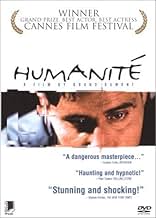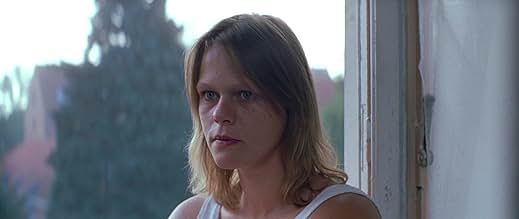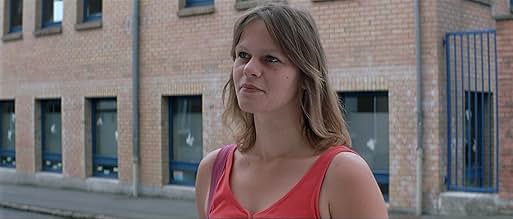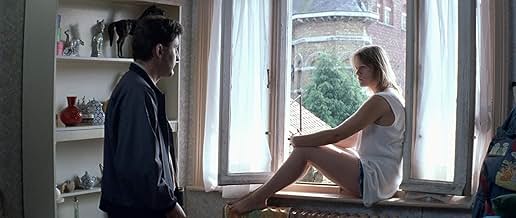VALUTAZIONE IMDb
6,8/10
5304
LA TUA VALUTAZIONE
In una cittadina vicino a Calais, l'ispettore vedovo de Winter indaga sull'omicidio di una bambina e passa il suo tempo libero con Domino, di cui è innamorato.In una cittadina vicino a Calais, l'ispettore vedovo de Winter indaga sull'omicidio di una bambina e passa il suo tempo libero con Domino, di cui è innamorato.In una cittadina vicino a Calais, l'ispettore vedovo de Winter indaga sull'omicidio di una bambina e passa il suo tempo libero con Domino, di cui è innamorato.
- Premi
- 3 vittorie e 3 candidature totali
Darius
- L'infirmier
- (as Daniel Leroux)
Robert Bunzi
- Le policier anglais
- (as Robert Bunzl)
Recensioni in evidenza
After seeing L'Humanite at the Edinburgh festival, it's difficult to imagine it winning the Cannes Grand Jury Prize as well as the best actor and actress awards. The film is an unquestionably beautiful but otherwise unremarkable example of French cinema. Call me a stuffy American, but I found the opening sequence of the rape victim's damaged body to be completely unnecessary. The film's title is the most pretentious in recent memory.
This film has been praised as shocking, fascinating, and hypnotic; and I can only conclude that I'm not easily shocked, fascinated, or hypnotized. I was lulled to sleep several times, and watched the film over the course of several days. The film is quite sedately paced. An example:
You get a shot of Pharoan looking at his boss's collar. The shot of the collar holds long enough for you to think "Hm, he sweats a lot." The shot holds long enough for you to think "okay, I got that, thanks. He sweats a lot." Then it holds long enough for you to think "All right already! Go wake up the editor."
A sequence like that would not be a problem when the cinematography is particularly good, except the cinematography in this film is not. It is competent, straightforward, unstylized, perhaps even dull; in other words, the cinematography serves the story perfectly.
The sedate pacing might not be a problem with different cinematography, which would affect the story for the better: the film is a psychological exploration, yet the people we're meant to sympathize with are typically shown in long shots or in closeup but with largely unchanging expressions. If something is going on behind the eyes, we can only guess what it is; and from the slack-jawed expression, we guess that what it is might not even be particularly profound. Wounded, yes, sad, yes, but we've seen that before and better, and it's nothing new. We need a reason to care *this time*, and for many people that reason won't be there.
The main character is a cipher, perhaps deliberately so, but the result is a film that doesn't tell you anything, and doesn't even tell you why it doesn't tell you anything--not the nihilism or the weary practicality of some noir films, but merely a bloated anecdote with an obscure or missing point. Unfortunately the anecdote, aside from being quite slow, is also almost completely humorless. The result is a film only for people with extraordinary patience and good will.
You get a shot of Pharoan looking at his boss's collar. The shot of the collar holds long enough for you to think "Hm, he sweats a lot." The shot holds long enough for you to think "okay, I got that, thanks. He sweats a lot." Then it holds long enough for you to think "All right already! Go wake up the editor."
A sequence like that would not be a problem when the cinematography is particularly good, except the cinematography in this film is not. It is competent, straightforward, unstylized, perhaps even dull; in other words, the cinematography serves the story perfectly.
The sedate pacing might not be a problem with different cinematography, which would affect the story for the better: the film is a psychological exploration, yet the people we're meant to sympathize with are typically shown in long shots or in closeup but with largely unchanging expressions. If something is going on behind the eyes, we can only guess what it is; and from the slack-jawed expression, we guess that what it is might not even be particularly profound. Wounded, yes, sad, yes, but we've seen that before and better, and it's nothing new. We need a reason to care *this time*, and for many people that reason won't be there.
The main character is a cipher, perhaps deliberately so, but the result is a film that doesn't tell you anything, and doesn't even tell you why it doesn't tell you anything--not the nihilism or the weary practicality of some noir films, but merely a bloated anecdote with an obscure or missing point. Unfortunately the anecdote, aside from being quite slow, is also almost completely humorless. The result is a film only for people with extraordinary patience and good will.
It is said that Humanite is not for everyone. And i would surely support that claim since I am a steward in the Tel Aviv Cinematheque and had to get up, about every two minutes to open the door to someone sneaker.
Still, I managed to get quite a clear impression of the film which is in my opinion a superb one. Although many people find themselves puzzled by the characters (virtually everyone in the show i attended came out of the cinema looking almost personally insulted by the film) i think that if you know and love Dostoevsky's books you won't find them so hard to understand. Pharaon is simply Prince Mishkin. He is assulted by the bluntness and cruelness of existence and the crime he tries to solve - but is overwhelmed with humility, love and compassion to the world. While his friend make love in a way that seems almost like a rape he makes love to the world, to the clods of the earth. When he rides his bicycle his upper body seems to be moving as if he was making love. But most of all he feels diligent compassion to the world and it's assaulters. The film shows the violence everywhere. Pharaon sees this violence and with his deep gaze manages to disarm it (with protesters and with Domino). I think that Pharaon is a really great acting performance. Pharaon like Mishkin in Dostoevky's notebooks 'sees not in the faces of people but in their hearts.'. The investigation taking place is like an investigation of the inner self. Of the human soul, of humanity. It's a category against Humanity and Pharaon's who is the categor manages to find compassion to humanity. Its sort of like an 'apocalypse now' in rural france.
Still, I managed to get quite a clear impression of the film which is in my opinion a superb one. Although many people find themselves puzzled by the characters (virtually everyone in the show i attended came out of the cinema looking almost personally insulted by the film) i think that if you know and love Dostoevsky's books you won't find them so hard to understand. Pharaon is simply Prince Mishkin. He is assulted by the bluntness and cruelness of existence and the crime he tries to solve - but is overwhelmed with humility, love and compassion to the world. While his friend make love in a way that seems almost like a rape he makes love to the world, to the clods of the earth. When he rides his bicycle his upper body seems to be moving as if he was making love. But most of all he feels diligent compassion to the world and it's assaulters. The film shows the violence everywhere. Pharaon sees this violence and with his deep gaze manages to disarm it (with protesters and with Domino). I think that Pharaon is a really great acting performance. Pharaon like Mishkin in Dostoevky's notebooks 'sees not in the faces of people but in their hearts.'. The investigation taking place is like an investigation of the inner self. Of the human soul, of humanity. It's a category against Humanity and Pharaon's who is the categor manages to find compassion to humanity. Its sort of like an 'apocalypse now' in rural france.
This French oddity from second-time director Bruno Dumont is a masterpiece. Four minutes into the film I was ready to switch it off, but once I'd settled into the rhythm of the film I was transfixed. That took about 20 minutes, and once I'd finished the film I re-watched those first 20 minutes again.
A policeman investigates the brutal murder of a young girl in a French town and that's pretty much it. It's even less than that in some respects. For example the girl is found in the opening minutes, but it's 50 minutes before any real investigation begins. Instead it focuses on the policeman (Pharaon) and his two friends (lovers Domino and Joseph). They go to the beach, to a restaurant, stand outside their houses having stunted conversations and generally wasting the day away. Pharaon goes for a bicycle ride and tends to his allotment. Essentially nothing happens. There are maybe four or five actual plot points altogether, and the rest is filled with chat of the "Hi, how are you?" variety, long shots of people walking or driving, or opening doors. The entire film follows a kind of rhythmic cycle that becomes hypnotic if you allow it.
Which brings us to the actors. The DVD notes say they're all non-professionals. Not amateur actors, but real people who are acting for the first time. The actor who plays Joseph does reasonably well, but Domino is excellent (and it's an extremely brave performance for any actress).
Emmanuel Schotte (as Pharaon) is amazing. It's simply one of the greatest performances I've ever seen. Imagine Travis Bickle with 99pc of the anger taken out. Then cross him with Forrest Gump (with non of Hanks' caricature or comedy). Cast a non-actor who looks like a cross between Clive Owen and Alfred Molina and you're somewhere close. He's a very unlikely cop. He's wide-eyed, innocent, and simple. He's slow and deliberate. Brief comments from other characters tell us his wife and child died two years ago, and he looks like a man still stunned, as if he'd just heard the news. This is never hinted at once; we don't ever see what he was like before, no one ever tells him "You've changed", but the audience gets the feeling this is a man suffering desperately from the pain of grief. Most of this is expressed in Schotte's eyes which are desperately sad.
This low-key little film requires patience. Without Schotte's performance I don't think there'd be much of a film here. Be prepared for an extremely slow film, but one that's never boring. It will polarise opinion like few other films I've seen so I can't recommend it to everyone (and there are some very graphic sex scenes), but I thought it was amazing.
A policeman investigates the brutal murder of a young girl in a French town and that's pretty much it. It's even less than that in some respects. For example the girl is found in the opening minutes, but it's 50 minutes before any real investigation begins. Instead it focuses on the policeman (Pharaon) and his two friends (lovers Domino and Joseph). They go to the beach, to a restaurant, stand outside their houses having stunted conversations and generally wasting the day away. Pharaon goes for a bicycle ride and tends to his allotment. Essentially nothing happens. There are maybe four or five actual plot points altogether, and the rest is filled with chat of the "Hi, how are you?" variety, long shots of people walking or driving, or opening doors. The entire film follows a kind of rhythmic cycle that becomes hypnotic if you allow it.
Which brings us to the actors. The DVD notes say they're all non-professionals. Not amateur actors, but real people who are acting for the first time. The actor who plays Joseph does reasonably well, but Domino is excellent (and it's an extremely brave performance for any actress).
Emmanuel Schotte (as Pharaon) is amazing. It's simply one of the greatest performances I've ever seen. Imagine Travis Bickle with 99pc of the anger taken out. Then cross him with Forrest Gump (with non of Hanks' caricature or comedy). Cast a non-actor who looks like a cross between Clive Owen and Alfred Molina and you're somewhere close. He's a very unlikely cop. He's wide-eyed, innocent, and simple. He's slow and deliberate. Brief comments from other characters tell us his wife and child died two years ago, and he looks like a man still stunned, as if he'd just heard the news. This is never hinted at once; we don't ever see what he was like before, no one ever tells him "You've changed", but the audience gets the feeling this is a man suffering desperately from the pain of grief. Most of this is expressed in Schotte's eyes which are desperately sad.
This low-key little film requires patience. Without Schotte's performance I don't think there'd be much of a film here. Be prepared for an extremely slow film, but one that's never boring. It will polarise opinion like few other films I've seen so I can't recommend it to everyone (and there are some very graphic sex scenes), but I thought it was amazing.
"The power of cinema lies in the return of man to the body, to the heart, to truth" - Bruno Dumont
In L'Humanite, by Bruno Dumont (La Vie de Jesus), Pharaon de Winter (Emmanuel Schotte) is a Police Superintendent called upon to investigate the murder and rape of an 11-year old girl. Flaunting almost every cinematic convention, the film is not about solving a crime but a 2 1/2-hour poem of mood, time, silence and spirit. Set in northern France in the director's hometown of Bailleul, the characters are unglamorous members of the working class. Dumont devotes long stretches of the film to simply observing Pharaon going about his life: eating an apple, tending his garden, watching a soccer game on television, interacting with his mother, or being a friend to his neighbor Domino (Severine Caneele), a rugged factory worker and her obnoxious bus-driver boyfriend Joseph (Philippe Tullier). He is an unlikely cop, a passive, stoop-shouldered, and empathetic man who would sooner kiss a prisoner on the lips or stroke his neck as browbeat him. Pharaon sees the suffering of the world and wants to hold it in his hands and stroke it. Schotte's performance is so expressive that his best actor award at Cannes was criticized because most people thought he wasn't acting, just being himself.
As the film opens, a man is walking in the distance alone across a grassy hill. Suddenly as the camera moves in for a close-up, he collapses in the mud and just lays there for a while. Is he dead or alive? Did he commit the crime? In the next scene, he is sitting in his car listening to harpsichord music and we discover that he is a policeman talking in a barely audible voice to his superior. The film cuts away to the battered body of an 11-year old girl, her torn and bloody vagina graphically shown as the police gather. Pharaon maintains the same anguished, enigmatic look on his face throughout that makes us uncertain if he is the murderer or the Second Coming of Christ. We know very little about him except that he "lost" his wife and child a few years ago, but it is never made clear whether he lost them or they lost him. Signs of passion or involvement are rare but come with a sudden ferocity, as when he is walking across the crime scene and starts to scream at the top of his lungs, a sound drowned out only by the passing Eurostar train.
L'Humanite is an involving and disturbing film that you cannot feel lukewarm about. It is profoundly moving but often agonizingly slow and virtually unwatchable in some of its graphic details (you may never want to have sex again after watching these mechanical exercises). The climax of the film is as perplexing as the beginning with an ambiguous resolution that I'm not quite sure what to make of. What I do know is that I felt as vitally alive watching this film as I did the first time that I saw Leolo by Jean-Claude Lauzon. L'Humanite is a breath of fresh air on the turgid cinema landscape and Dumont is as honest and challenging a director as I've seen in quite a long time. His film continually forces us to question what we are looking at and, as the title suggests, keeps bringing us closer and closer to the core of what makes us truly human.
In L'Humanite, by Bruno Dumont (La Vie de Jesus), Pharaon de Winter (Emmanuel Schotte) is a Police Superintendent called upon to investigate the murder and rape of an 11-year old girl. Flaunting almost every cinematic convention, the film is not about solving a crime but a 2 1/2-hour poem of mood, time, silence and spirit. Set in northern France in the director's hometown of Bailleul, the characters are unglamorous members of the working class. Dumont devotes long stretches of the film to simply observing Pharaon going about his life: eating an apple, tending his garden, watching a soccer game on television, interacting with his mother, or being a friend to his neighbor Domino (Severine Caneele), a rugged factory worker and her obnoxious bus-driver boyfriend Joseph (Philippe Tullier). He is an unlikely cop, a passive, stoop-shouldered, and empathetic man who would sooner kiss a prisoner on the lips or stroke his neck as browbeat him. Pharaon sees the suffering of the world and wants to hold it in his hands and stroke it. Schotte's performance is so expressive that his best actor award at Cannes was criticized because most people thought he wasn't acting, just being himself.
As the film opens, a man is walking in the distance alone across a grassy hill. Suddenly as the camera moves in for a close-up, he collapses in the mud and just lays there for a while. Is he dead or alive? Did he commit the crime? In the next scene, he is sitting in his car listening to harpsichord music and we discover that he is a policeman talking in a barely audible voice to his superior. The film cuts away to the battered body of an 11-year old girl, her torn and bloody vagina graphically shown as the police gather. Pharaon maintains the same anguished, enigmatic look on his face throughout that makes us uncertain if he is the murderer or the Second Coming of Christ. We know very little about him except that he "lost" his wife and child a few years ago, but it is never made clear whether he lost them or they lost him. Signs of passion or involvement are rare but come with a sudden ferocity, as when he is walking across the crime scene and starts to scream at the top of his lungs, a sound drowned out only by the passing Eurostar train.
L'Humanite is an involving and disturbing film that you cannot feel lukewarm about. It is profoundly moving but often agonizingly slow and virtually unwatchable in some of its graphic details (you may never want to have sex again after watching these mechanical exercises). The climax of the film is as perplexing as the beginning with an ambiguous resolution that I'm not quite sure what to make of. What I do know is that I felt as vitally alive watching this film as I did the first time that I saw Leolo by Jean-Claude Lauzon. L'Humanite is a breath of fresh air on the turgid cinema landscape and Dumont is as honest and challenging a director as I've seen in quite a long time. His film continually forces us to question what we are looking at and, as the title suggests, keeps bringing us closer and closer to the core of what makes us truly human.
Lo sapevi?
- QuizThe body of the raped little girl was a silicone cast.
- Citazioni
[first lines]
l'inspecteur de police Pharaon De Winter: I'm coming.
- Versioni alternativeItalian distributor BIM originally removed about 2 minutes of sex footage from the Italian theatrical release in order to avoid a 'not under 18' rating. When the press criticized this self-censorship attempt, the distributor reissued the film in its original, integral form.
- Colonne sonoreLe Vertigo, Rondeau. Modérément
from "Pièce de Clavecin"
Music by Pancrace Royer
Performed by William Christie
Courtesy of harmonia mundi
I più visti
Accedi per valutare e creare un elenco di titoli salvati per ottenere consigli personalizzati
- How long is Humanité?Powered by Alexa
Dettagli
- Data di uscita
- Paese di origine
- Siti ufficiali
- Lingue
- Celebre anche come
- Humanity
- Luoghi delle riprese
- Bailleul, Nord, Francia(Village)
- Aziende produttrici
- Vedi altri crediti dell’azienda su IMDbPro
Botteghino
- Lordo Stati Uniti e Canada
- 113.495 USD
- Fine settimana di apertura Stati Uniti e Canada
- 10.075 USD
- 18 giu 2000
- Tempo di esecuzione
- 2h 21min(141 min)
- Colore
- Mix di suoni
- Proporzioni
- 2.35 : 1
Contribuisci a questa pagina
Suggerisci una modifica o aggiungi i contenuti mancanti




















